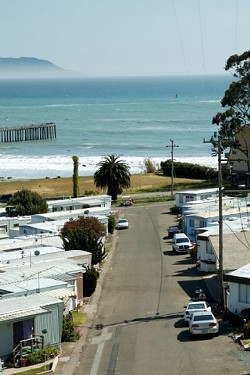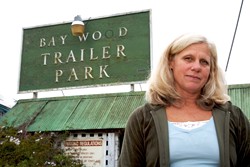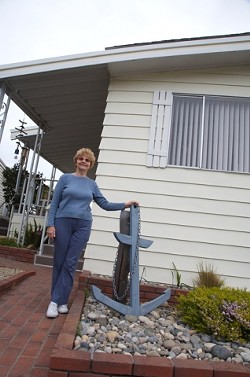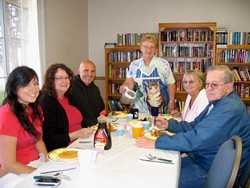"Who's the lucky winner?"
Forks and conversation stop, mid-pancake-breakfast, with eyes of all ages watching as the winning 50-50 raffle ticket is plucked from a coffee can. They barely notice the clearing fog down the hill beyond a patchwork of roofs and neatly trimmed shrubbery, revealing a shimmering ocean view from the clubhouse window.
These residents of the county's largest mobile-home park, Mesa

- PHOTO BY JESSE ACOSTA
- AFFORDABLE HOUSING : Bella Vista in Cayucos is just one of many mobile-home parks in San Luis Obispo County. Thousands of county residents have found housing they can afford in well-located mobile-home parks, some of which are under threat of converting to other uses.
Like the thousands of mobile-home dwellers in San Luis Obispo County, though, they worry that a changing real estate climate may make them into losers instead. Many feel that their homes are facing an uncertain future, as rising land values mean some park owners who own the space under these residents' homes are looking to cash in on their real estate treasure.
Up and down California and in many other states mobile-home parks have moved from stigma to spotlight. More and more park owners, whether local families or national corporations, are looking at converting their parks into a more lucrative investment return, such as condominiums, without rent control protections in place.
Worried about the loss of affordable housing, cities and counties are imposing a ban on these conversions. The SLO County Board of Supervisors voted in such a moratorium in mid-March. The two-year local ban, which will apply in the unincorporated areas of the county, will provide time to figure out a more permanent solution to the complex issue.
One small park, Oceano Trailer Park, closed just before the supervisors' recent vote in March. Owners of two others Sweet Springs in Arroyo Grande and Hidden Hills in San Luis Obispo have met with county staff about conversion or closure. Rod & Reel mobile-home park in Cambria closed in 2004.
"It's an incredible tangle," says SLO County Supervisor Bruce Gibson, who's wrestled with the problem both as a county planning commissioner and a supervisor.
"The threat is real. We need time to figure this out," he explains. "We have to balance the landowners' right to do something with their property versus the residents' rights."

- PHOTO BY JESSE ACOSTA
- RENT CONTROLLED : Park owner Gretchen Moreno in Baywood says voter-approved rent control cuts down on investment returns and puts too much responsibility for providing affordable housing on park owners.
# County planner Ted Bench, who's working on the details of the county's future mobile-home ordinance, notes, "It's a complicated issue, with so many moving parts."
The homes themselves, though, don't move much anymore the newer ones are technically known as "manufactured," not mobile, homes. They sit in communities no longer called "trailer parks" in a range of sizes, from more than 300 spaces like Mesa Dunes, to 20 or less. An estimated 6,000 people live in the 40-plus mobile-home parks in the unincorporated parts of the county, often in prime spots, with hundreds more living in parks within city boundaries.
Many parks are well manicured, with swimming pools and community centers and colorful flower gardens, where seniors and working families own their four walls and the roof over their head. Other parks offer rentals, providing the most-affordable homes for the county's lowest-income residents.
"Many of the parks started years ago as recreational trailer parks. They're in stunning locations, but have some really ancient units. That's true for many of the local parks with mom-and-pop owners," says Carol Florence of Oasis Associates, who represents the family owners of Bella Vista park in Cayucos. She has spoken at county meetings on the issue, calling for "equity for both sides of the table."
Is there a stigma about mobile-home parks?
"If people are still thinking of old vacation trailers, old beat-up places from the '50s and '60s, maybe so. But here in this county, some of the better parks are very attractive and desirable," says Jerry Rioux, executive director of SLO County Housing Trust Fund and an advocate for park protection.
In addition to providing the county's biggest stock of affordable housing, he adds, mobile-home living is also "a lifestyle choice that's attractive to people."

- PHOTO BY JESSE ACOSTA
- UNMOVING MOBILE : At Sea Oaks in Los Osos, residents like Marie Pounders have become involved in the politics of protecting their homes.
# As Sharon McMahan tells a visitor as she pours coffee at the recent pancake breakfast in the Mesa Dunes clubhouse, "We're not just a mobile-home or manufactured-home park. We're a community. It's the security of the whole thing. You've got neighbors nearby."
"The neighbors look out for each other," agrees Christine Gaiger of Arroyo Grande, who brings her family to the monthly breakfast to join her parents, park residents Jesse and Joyce Cook.
"I don't have to worry about my parents," she says, as her mother talks of daily walks on the fitness trail and three-times-a-week sessions at the swimming pool at the mobile-home park.
At another table, 2-year-old Jonathan Rosas happily digs in to his plate of pancakes next to his parents, Alex and Yesenia. The young family recently purchased their first home, a two-bedroom, two-bath singlewide in the park.
"It's perfect for us. Now it's an investment for the future," says Alex.
For the Paulys, another young family that recently moved into Mesa Dunes, it was a housing choice that allowed them to return to their native Central Coast from Seattle.
"The people are so nice. It's safe to go for walks, and safe for our kids to ride their bikes, and they love the pool!" says Tami Pauly, adding that their three-bedroom, two-bath home "the only thing we could afford" has a yard with a koi pond and room for their new puppy.
Many of the residents, retired or semi-retired, spend time volunteering for various causes around the county.
"We may be retired, but we're not out here sitting on our butts. We're very active," says McMahan, who also serves as president of the Mesa Dunes Homeowners Association.

- PHOTO BY JESSE ACOSTA
- MORE THAN A HOME : Many mobile-home parks provide residents with a safe, enjoyable community. Here, Sharon McMahan serves coffee at a recent pancake breakfast at Mesa Dunes park in Nipomo.
# "It's not a 'trailer trash' situation here," explains Joannne Harvey as she clears away some plates. "There are lots of young families and people working in important jobs, and lots of volunteers in the community. We're a really important spoke of the community's wheel."
The Mesa Dunes "extended family" of residents is brought together by "the common threat of an uncertain future," if the desirable property is converted to another use, according to resident Laurie Olvera.
Up the coast in Baywood Park, Gretchen Moreno says it's just as frightening to be on the other side of the picture, as a park owner. She and her husband Cayetano own one of the county's smallest parks, Baywood Trailer Park, as well as small parks in Morro Bay and San Luis Obispo. Investment income for the Morenos is limited by city or county rent-control ordinances, including the county's mobile-home rent control ordinance, passed by voter initiative in 1984.
"It's created a hardship for park owners, and it's discouraging people from wanting to stay in business as a park owner," Moreno says.
The county's new two-year ban on mobile-home parks converting to other uses is a "double whammy" along with rent control, she says, adding, "I don't like the idea that the government can tell us what we can do with our property."
One of the smallest spaces in their Baywood park rents for $150 a month, or, as Moreno says, "less than what you pay for a cell phone." Under county rent control, annual increases in space rent are limited to 60 percent of the Consumer Price Index unless park owners prove "hardship" by opening their books.
"I'm happy they can get cheap rent. Our tenants are needy people. But why should we as owners have to bear the weight and pick up the slack of affordable housing? It should be shared by all," Moreno says.
She predicts the parks will "fade along with drive-in theaters," adding, "These parks were all for recreation, long before affordable housing, from the '50s when they'd just tow their trailer to Baywood Park or Morro Bay, like I Love Lucy.
"They were trailer parks, then they became mobile home parks, and now it's just affordable housing," she said. "If the issue is a shortage of affordable housing, the county should put some in."
Rent control is on the radar of another mobile-home park owner, multi-billionaire Sam Zell, chairman of the Chicago-based Equity Lifestyle Properties, Inc., a real estate investment trust formerly known as Manufactured Home Communities. The company bought Sea Oaks mobile-home park in Los Osos, then, in 2002, it served notice on some tenants that their rent would increase to "market rates," says SLO County Counsel Tim McNulty.
Nine Sea Oaks mobile-home dwellers whom McNulty basically described as elderly appealed to the county's Mobile-home Rent Review Board, which upheld rent control for the park. The company took the issue to state and federal court, and has been battling the county for nearly five years, McNulty says.
The Sea Oaks manager referred questions to the company. Calls to Equity Lifestyle Properties' main headquarters in Chicago were directed to a regional office in Arizona. A representative from that office didn't return calls as of press time.
McNulty said that he knows of other cities that have faced or are facing court challenges to rent-control ordinances from Equity Lifestyle Properties.
Marie Pounders, a Sea Oaks resident, is also keeping an eye on mobile-home developments. She said that she understands the motivation behind potential park changes that are looming in the area: "A big developer will look at this lovely, gently rolling hillside, where 250 condos will fit in this 50-space park."
That realization galvanized her into action as a volunteer for the Golden State Manufactured-home Owners League at Sea Oaks. Now she speaks up on the park-conversion issue at meetings around the county.
Piles of paper and reports are stacked up around the computer in an alcove of Pounder's comfortable mobile home, attesting to her learning curve on the hot topic. Every week, she says, new cities and counties in California and around the United States are enacting ordinances similar to SLO County's moratorium on mobile-home park conversions. Two bills on the issue were recently introduced in the state Legislature.
Next door to Sea Oaks on Los Osos Valley Road, residents of Sunny Oaks mobile-home park say they're feeling more secure about their future. They're becoming a resident-owned park. With the help of a nonprofit, Resident Owned Parks, Inc., they're each buying a share in their park.
Judith Miller, president of the Homeowners Association at Sunny Oaks, explains that the residents had been concerned about the park converting to another use, and a majority voted in 2005 to allow a nonprofit to purchase the park. Each homeowner now pays a slightly higher monthly rent "still much more affordable than mortgage payments on a house, or apartment rent" and after 25 years everyone who participates will have a share in the total ownership of the park. For those not taking part, rent control remains in force.
"Sunny Oaks has incredible views, on the border of the Los Osos Oaks reserve. It's a two-minute walk to get into the forest. We have potlucks, a yearly yard sale, a garden tour for our own residents," says Miller.
She credits the former owners of the park for caring about the residents and negotiating a sale to Resident Owned Parks to protect them.
Another mobile-home park owner who's won praise for caring about his residents is Steve MacElvaine, owner of Rancho Colina on Hwy. 41 near Morro Bay. The majority of park residents have agreed to buy the space where their home sits, and are due to own their own lots and manage the park by the end of this year, MacElvaine told the Planning Commission in November.
"He really does care about the residents. He's going to great pains for them," says Supervisor Gibson.
As another long-term solution to protect the affordable housing found in mobile-home parks, Gibson says he's interested in the idea of a community land trust, which would buy land on the open market and reserve it for affordable housing.
County planners are embarking on the preparation of a permanent mobile-home park conversion ordinance, which would include financial compensation for displaced mobile-home owners incentives for park owners to keep their parks in operation a new zoning category for existing and new mobile-home parks and other regulations to preserve affordable housing in the parks.
"Part of the complexity," says Gibson, "is the huge range of mobile-home parks from tiny to big, highly profitable or on the edge and a huge range of intentions on the part of park owners, whether they'd go to the mat for their residents or they're just looking at profits. Trying to craft one policy for all these is difficult."
As the pancake breakfast at Mesa Dunes draws to a close, Homeowners Association president McMahan is scrubbing the scrambled-egg pan in the clubhouse kitchen.
"We want to come up with something we can all believe in something that's good for all of us," she says.
And even though the homes in these residential communities scattered around the county may not be that mobile nowadays, Gibson concludes, "I'm hoping the owners and the residents can come to the table together, and see where we go."
Freelance journalist Kathy Johnston may be reached at [email protected].

Comments